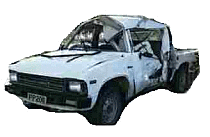
Police, Ambulance and Fire Service in Cyprus use the Emergency number that is valid in all countries of the EU, 112.

Traffic Collisions.
The police will only attend accidents that involve injury, driving offences or special situations where, for example, the road is blocked, or further danger is likely to be caused.
Your insurance documentation should include a number to contact if you are involved in a crash. This will normally be a recovery company. They will make any arrangements necessary on behalf of the insurance company.
Emergency Number 112
When you call the emergency number, 112 it is directed to the Police in the first instance.
Police will call an ambulance or the fire service to the scene if required.
Always carry with you:
In a rented car – driving licence – rental documents
For a locally registered car – driving licence and insurance.
Police Officers in Cyprus invariably speak some English, and many have a good knowledge of the language.
In Cyprus, the rules for removing a vehicle after an accident depend on the severity of the incident.
For Minor Accidents:
As of a law passed on July 10, 2025, for minor accidents where there are no injuries and only light damage, drivers are now required to:
- Take photos: Document the damage to all vehicles, their positions, and the general scene of the accident.
- Exchange details: Get the driver’s licenses and vehicle documentation details from all involved parties.
- Remove vehicles from the roadway: This is a crucial change to reduce traffic congestion. Once photos and details are exchanged, you should move your vehicle off the road if it’s safe to do so and the vehicle is still drivable.
- Complete the European Accident Statement: This can be done on paper or electronically.
For Serious Accidents (with injuries or significant damage):
If there are personal injuries or significant property damage, you should not move the vehicles until the police arrive and have recorded the incident. In such cases:
- Ensure immediate safety: Turn on hazard lights. If the accident is at night, place a warning triangle at a safe distance.
- Call the police (112) and ambulance if needed.
- Do not admit liability: Avoid making any statements that could be interpreted as an admission of fault.
- Exchange information: Get full names, contact details, vehicle registration numbers, insurance company names and policy numbers, and driver’s license numbers. Collect witness details if possible.
- Document the scene: Take photos of everything (vehicles, damage, road conditions, signs, injuries).
- Inform your insurance provider as soon as possible, and call the phone number stated in your insurance certificate that you should call in case of an accident.
General Advice:
- It’s always recommended to contact your insurance company’s accident care service, as many provide immediate assistance with on-site recording, photography, and towing services if needed.
- Even for minor accidents, seeking medical evaluation is advisable, as some injuries may not be immediately apparent.
- Consider consulting a legal professional, especially for more complex cases or if there are injuries, to understand your rights and ensure you receive proper compensation.
The key takeaway is that for minor accidents, you are now expected to remove your vehicle from the road after documenting the scene. For serious accidents, you must wait for the authorities.